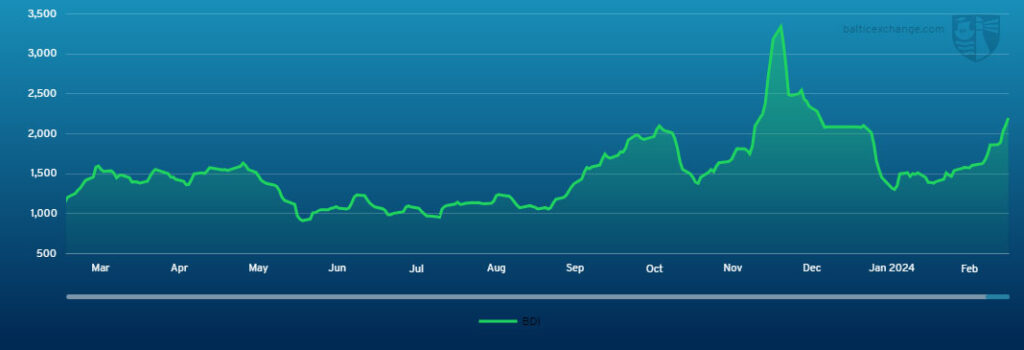THE BALTIC Dry Index continued on a sharp upward trajectory this past week, beginning the week on 1871 and hitting 2203 on Friday 1 March.

Capesize
The week started with a modest increase on the BCI 5TC, accompanied by steady activity in the Pacific and relatively calm conditions in the Atlantic. As the days progressed, the Pacific market saw increased activity and rising rates, particularly highlighted by a significant surge mid-week, driven by strong cargo demand. There were reports of more than 10 vessels fixed from West Australia to China, resulting in the C5 index rising by US$1.075 to US$12.160.
In the Atlantic there was an influx of new cargo for both trans-Atlantic and fronthaul which helped to bolster sentiment with a market that already had limited availability of tonnage. Reports of robust fixtures led to a significant uptick in the C9 index, which rose by US$2,562 to reach US$53,375, and the C8 index, which climbed by US$5,496 to US$32,173.
From South Brazil and West Africa to the Far East there was a noticeable difference between the bid and offer price, resulting in limited activity although optimism persisted, as evidenced by the C3 index’s rise of US$1.205 to US$27,465. As the week comes to an end this positive trend has persisted, albeit at a somewhat slower pace, as reflected in the C5 index today edging up by 0.875 to 13.645 and the C3 index which has risen by 0.872 to US$28.767. All in all, it has been a very positive end to the week as evidenced by the BCI 5TC which started the week at US$26,233 and has ended at US$32,985.
Panamax
It was an eventful week with the market trend moving one way and then the other. The week began on a negative tone, sparked into life mid-week with an FFA drive only to level off as the week ended.
In the Atlantic, it was a less than clear picture in the North with minimal trans-Atlantic activity with rates under pressure all week, conversely decent mineral and grain demand for fronthaul trips lent some support to rates here. EC South America found support for early April arrival dates, US$18,000 concluded a few times for 82,000-dwt types delivery to India for trips via EC South America redelivery
Far east. In Asia, good levels of cargo replenishment were witnessed all week, driving rates forward as tonnage was cleared out both in the south and the north of the basin. A solid week too for period with various deals concluded as the nearby optimism in the market persisted.
Ultramax/Supramax
Positivity was seen across the Asia Markets. A 64,000-dwt fixed from Caofeidian via Indonesia to EC India-Bangladesh at US$15,000 whilst a 62,000-dwt fixed from the Philippines via Indonesia to Thailand at US$20,000. Nopac was also active, an Ultramax linked to fixing from South Korea via Nopac to Bangladesh at US$14,650. In South Africa, a 66,000-dwt fixed from Port Elizabeth to Singapore-Japan at US$28,000 plus a US$280,000 ballast bonus. The Atlantic was more subdued with a lack of fresh enquiry.
A 63,000-dwt was fixed from SW Pass via the Cape of Good Hope to Japan with grains at US$28,000. A 64,000-dwt fixed from Southampton to the Eastern Mediterranean with scrap at US$19,000 and a 63,000-dwt fixed from Mersin to Abidjan with a cargo of clinker at US$15,000.
Period activity remained with a 58,000-dwt opening in Kwangyang fixing for seven to nine months with PG-Japan redelivery at US$15,400 whilst a 63,000-dwt open in Mundra fixed for a minimum of 5 months to max 15 October at US$19,600.
Handysize
The South Atlantic showed signs of positivity as water levels in the River Plate improved, a 38,000-dwt was fixed for mid-March dates basis delivery Recalada to Algeria at US$17,000 whilst a 37,000-dwt fixed from Recalada to WC South America at around US$25,000.
The Continent and Mediterranean were said to be balanced with a 39,000-dwt fixing from Bourgas to Spain at US$15,000 whilst pressure remained on the tonnage in the US Gulf due to a lack of enquiry, a 36,000-dwt fixed from Key West via the US Gulf to Turkey at US$9,250.
In contrast, rates have been steadily climbing across the Asia markets with limited tonnage availability as a main factor. A 42,000-dwt opening in Japan fixed via Nopac for a round voyage to Japan at US$13,000 and a 37,000-dwt opening in Chiba fixed for a similar trip at US$12,750. A 32,000-dwt fixed from Semarang via Australia to Taiwan with an intended cargo of salt at US$15,000.
Clean
LR2
LR freight levels in the MEG continued downward this week. The 75kt MEG/Japan TC1 index lost 20% of its value to WS144.72. The 90kt MEG/UK-Continent TC20 trip to the UK-Continent also came down to the tune of US$556,250 leaving the index currently at US$4.47 million.
West of Suez, Mediterranean/East LR2 freight took a hit this week as the prolonged hiatus of activity continued. TC15 subsequently went from US$5.8 million to US$4.9 million for the run.
LR1
In the MEG, LR1 freight continued to be tested down this week. The 55kt MEG/Japan index of TC5 dropped to WS174.38 (-WS34.37). The 65kt MEG/UK-Continent of TC8 came off another US$399,000 this week to rest currently at US$3.92 million.
On the UK-Continent, the 60kt ARA/West Africa TC16 trip was flogged down this week seen in the index losing 25.94 points to WS187.81.
MR
MR’s in the MEG plateaued this week after last week’s significant improvement. TC17 is stable around the WS320 mark for the moment.
Up in the UK-Continent lots of industry delegates were in London attending International Energy week over the last few days, despite this MR freight levels held stable. The 37kt ARA/US-Atlantic coast of TC2 index floated around high WS240’s-Low WS250’s. On a TC19 run (37kt ARA/West Africa) the index mirrored the TC2 movement and hovered around the WS267.5-272.5 level.
The USG MR’s have suffered from another week of reportedly low demand for tonnage. TC14 (38kt US-Gulf/UK-Continent) dropped from WS172.5 to WS150.71. The 38kt US Gulf/Brazil on TC18 also shed 18.21 points to WS233.93. The 38kt US-Gulf/Caribbean TC21 is currently pegged at US$705,714, down US$140,000 from this time last week.
Handymax
In the Mediterranean, Handymax’s made a marked recovery seeing the TC6 index hop up 28.61 points to WS321.67.
Up in North West Europe, the TC23 30kt Cross UK-Continent saw an incremental improvement to WS262.5 (+WS4.17).
VLCC
The market further weakened this week. The rate for the 270,000 mt Middle East Gulf to China route lost another six points to WS59.95 which corresponds to a daily round-trip TCE of US$36,270 basis the Baltic Exchange’s vessel description.
In the Atlantic market, the 260,000 mt West Africa/China was lowered by 5.5 points to WS63.25 which shows a round voyage TCE of US$40,211 per day, while the rate for 270,000 mt US Gulf/China slipped US$33,333 to US$8,866,667 (providing a round-trip daily TCE of US$43,299).
Suezmax
Suezmaxes in West Africa remained around the WS104-105 level for the 130,000 mt Nigeria/UK Continent trip (a daily round-trip TCE of US$38,963). In the Mediterranean and Black Sea region the rate for 135,000 mt CPC/Med eased 1.5 points to WS109.70 (showing a daily TCE of US$38,761 round-trip). In the Middle East, the rate for 140,000 mt Middle East Gulf to the Mediterranean (via the Suez Canal) remained around the WS106-107 level basis routing via the Suez Canal.
Aframax
In the North Sea, the rate for the 80,000 mt Cross-UK Continent route collapsed 28.5 points to about WS130 (showing a round-trip daily TCE of around US$30,600 basis Hound Point to Wilhelmshaven).
In the Mediterranean market the rate for 80,000 mt Cross-Mediterranean had another 36 points taken away, to last be assessed at WS104.72 (basis Ceyhan to Lavera, that shows a daily round trip TCE of US$15,417).
Across the Atlantic, the Stateside market has been steadier in comparison. The rate for 70,000 mt East Coast Mexico/US Gulf (TD26) eased three points to WS185.31 (a daily TCE of US$48,049 round trip) while the rate for 70,000 mt Covenas/US Gulf (TD9) slid six points to WS178.44 (a round-trip TCE of US$40,270 per day). The rate for the trans-Atlantic route of 70,000 mt US Gulf/UK Continent (TD25) dropped three points to WS192.81 (a round trip TCE basis Houston/Rotterdam of US$46,607 per day).
LNG
As expected with International Energy Week bringing many industry professionals together out and about around London there were fewer fixtures reported. Rates were flat, with a slight softening across a few routes while period was very quiet.
BLNG1 Aus-Japan on the 2-stroke 174cbm ships lost US$2,230 to close at US$53,983 while the TFDE 160cbm ships finished at US$36,101 a fall of nearly two thousand. The Atlantic basin saw pretty much the only activity of the week with one ship reported on subs at around US$55,000 for a voyage into Japan from the US. The Baltic BLNG3 US-Japan closed at US$52,811 on the 2-strokes while the TFDE 160cbm ship finished at US$40,964 up US$1674. BLNG2 US-Cont on the 2-Stroke 174cbm ship closed at US$50,622 a rise of US$1,948 while the 160cbm ship finished at US$37,886 up US$1,476.
Period for LNG was very quiet 6-month terms remained at £62,500 while the 1-Year period rose US$1000 to US$78,300. 3-Year terms unchanged at US$90,100.
LPG
What goes up, must come down and BLPG1 Ras Tanura-Chiba certainly has lived up to the hype, a drop of US$23.429 over the week shaved off 28.82% off the routes value. With a final publication value of US$57.857 and a daily TCE earning equivalent of US$36,089 there was little hope that the few remaining cargoes would be able to stave off any further fall or initiate a new rise.
Across the Atlantic there was less dramatic movement, BLPG2 Houston-Flushing lost US$2.4 on the week to close at US$61.6 and a daily TCE earning of US$59,383. On BLPG3 Houston-Chiba a slightly bigger fall pushed rates to a close of US$110.286 and a daily TCE of US$44,431 – with International Energy Week on and many market participants out enjoying themselves it was expected to be quiet, and the index reacted accordingly.

